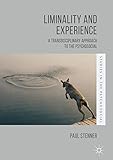Liminality and Experience [electronic resource] : A Transdisciplinary Approach to the Psychosocial / by Paul Stenner.
Material type: TextSeries: Studies in the PsychosocialPublisher: London : Palgrave Macmillan UK : Imprint: Palgrave Macmillan, 2017Description: IX, 297 p. 2 illus. online resourceContent type: text Media type: computer Carrier type: online resourceISBN: 9781137272119Subject(s): Psychology | Ontology | Personality | Social psychology | Emotions | Self | Identity (Psychology) | Psychology | Personality and Social Psychology | Psychosocial Studies | Emotion | Self and Identity | OntologyAdditional physical formats: Printed edition:: No titleDDC classification: 155.2 | 302 LOC classification: HM1001-1281Online resources: e-book Full-text access
TextSeries: Studies in the PsychosocialPublisher: London : Palgrave Macmillan UK : Imprint: Palgrave Macmillan, 2017Description: IX, 297 p. 2 illus. online resourceContent type: text Media type: computer Carrier type: online resourceISBN: 9781137272119Subject(s): Psychology | Ontology | Personality | Social psychology | Emotions | Self | Identity (Psychology) | Psychology | Personality and Social Psychology | Psychosocial Studies | Emotion | Self and Identity | OntologyAdditional physical formats: Printed edition:: No titleDDC classification: 155.2 | 302 LOC classification: HM1001-1281Online resources: e-book Full-text access | Item type | Current library | Collection | Call number | Copy number | Status | Notes | Date due | Barcode |
|---|---|---|---|---|---|---|---|---|
| E-Books | MEF eKitap Kütüphanesi | Springer Nature | HM1001 -1281 (Browse shelf (Opens below)) | Available | NATURE | 1419511-1001 |
Chapter 1. Introduction: Throwing psychosocial studies in at the deep end -- Chapter 2. This is not... the truth: on fabulation -- Chapter 3. This is not... food: on food for thought -- Chapter 4. This is not... a pipe: on the complexity of experience -- Chapter 5. This is not... a shock: on the passage between multiple worlds -- Chapter 6. This is not... a turn to affect: feeling between ontology and anthropology -- Chapter 7. Conclusion.
This book breathes new life into the study of liminal experiences of transition and transformation, or 'becoming'. It brings fresh insight into affect and emotion, dream and imagination, and fabulation and symbolism by tracing their relation to experiences of liminality. The author proposes a distinctive theory of the relationship between psychology and the social sciences with much to share with the arts. Its premise is that psychosocial existence is not made of 'stuff' like building blocks, but of happenings and events in which the many elements that compose our lives are temporarily drawn together. The social is not a thing but a flow of processes, and our personal subjectivity is part of that flow, 'selves' being tightly interwoven with 'others'. But there are breaks and ruptures in the flow, and during these liminal occasions our experience unravels and is rewoven. This book puts such moments at the core of the psychosocial research agenda. Of transdisciplinary scope, it will appeal beyond psychosocial studies and social psychology to all scholars interested in the interface between experience and social (dis)order. .
5
